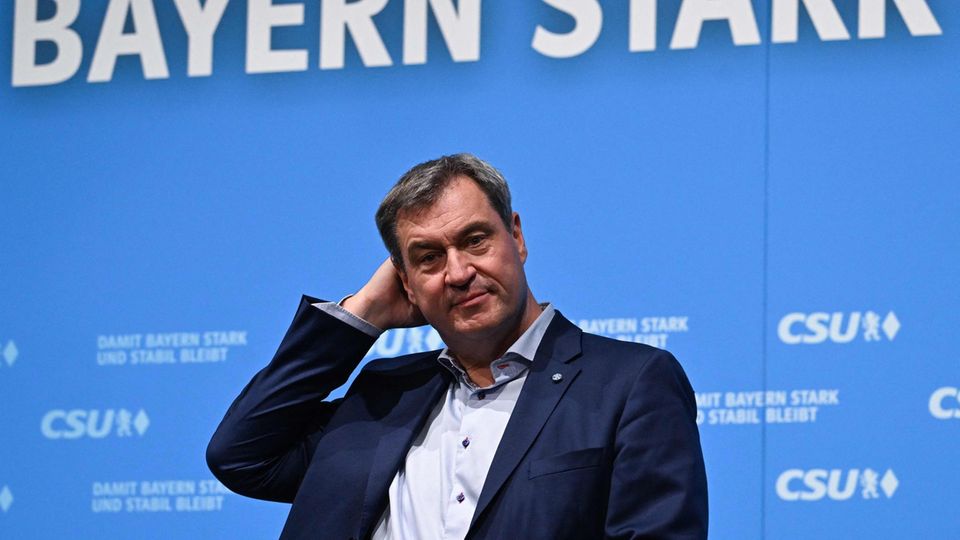Opinion
Elections in Bavaria and Hesse
Scholz now leads a cabinet of losers
Chancellor Olaf Scholz and Federal Interior Minister Nancy Faeser (both SPD)
© Bernd von Jutrczenka / DPA
The state elections became a reckoning with the politics of the traffic light coalition. The Chancellor needs a change.
CDU man Boris Rhein should actually write a thank you card to Nancy Faeser. Because the Federal Minister of the Interior, who wanted to replace the Prime Minister of Hesse, turned out to be one of his biggest election aides. 72,000 people in According to surveys, Hessians who voted for the SPD last time switched to the CDU this time, more than to any other party.
Since Sunday, the 53-year-old Social Democrat has been the face of her party’s defeat, and indeed of the entire traffic light. The Chancellor made the previously largely unknown Hessian SPD leader Federal Interior Minister in 2021 in order to make her known for the Hesse election. If Faeser now returns to Berlin damaged with a historically bad result, it will also be a defeat for the Chancellor.
That his coalition partners are not doing better? It’s little consolation. The Greens lost votes in both Hesse and Bavaria. The FDP was thrown out of the state parliament in Bavaria and had to worry about its whereabouts in Hesse on Sunday evening.
Both are in a special dilemma.
Continuing like this leads to the abyss
Whatever they do, they do it wrong – that is the message of the state elections. In Hesse, the Greens react smoothly and quietly with the Conservatives. In Bavaria they challenged the conservative Prime Minister. In both cases it was of no use.
The FDP started as a cooperative traffic light partner of the SPD and the Greens. After losing several state elections with this course, it transformed itself into an intra-coalition opposition. Whether it was the heating law or basic child welfare, the FDP stood against it. It didn’t pay off for her.
“If all parties in the traffic light lose, there will be a message for Berlin,” admitted SPD General Secretary Kevin Kühnert on election evening on ARD. Just which one?
Above all, probably the fact that “business as usual” leads to political abyss. The constant conflict over traffic lights, catastrophically communicated legislative proposals and a lack of sense for what concerns people have caused the AfD to soar.
The government is losing the trust of the people
The mood is bad, although the government has implemented many of its promises from the coalition agreement and the economic situation is not as bad as it could be, despite inflation and the energy crisis. It’s no use. The government is increasingly losing the people’s trust that it can solve the country’s problems. According to surveys, 53 percent of those surveyed in Hesse and Bavaria said that the state elections were “a good opportunity to give the traffic lights a lesson.”
The opposition cheers. “Rarely has a federal government received such a comprehensive slap as the traffic light parties have today,” wrote CDU politician Jens Spahn on the short message service X, formerly Twitter: “Scholz’s policy has no majority in Germany.” This may sound like partisan bluster, but it is mathematically correct. In the current Sunday questions, the SPD, Greens and FDP no longer have a majority.
The coalition members have now also become thoughtful. “Cruel numbers in Bavaria + Hesse,” posted SPD MP Ralf Stegner on X on Sunday evening. The traffic light parties would be “punished for public arguments,” according to his analysis. He recommends to his own people: “Governing in extremely difficult times requires sensible politics – which exists – but also professional external representation and communication.”
Better PR alone is unlikely to be enough, and it may never come. What is actually necessary is a different migration policy. But the Foreign Office has already announced that sea rescue off Italy’s coast will of course continue to be financed. And this just one day after the Chancellor indicated in a one-on-one conversation with Italian Prime Minister Giorgia Meloni on the sidelines of an EU meeting in Granada that he could understand the criticism of German financing and that a common path would be found .
The traffic light will also continue to argue about other topics. About relief, about the economy, about arms deliveries. The list of possibilities is long.
Where is the humility?
Visibly strong leadership is now required. A sign from Scholz that he has understood the warning signals from Bavaria and Hesse. A bit of humility, a sorry, a: We want to get better, including me personally. But Scholz not only becomes particularly stubborn when there is pressure from outside. He is also convinced that the current course of the traffic light is the right one, perhaps apart from deductions in the B grade as in the communication of the heating law. The Chancellor is certain that sticking to the current strategy will prove successful in the end. Just like back then, in 2021, when, contrary to all predictions, he became Chancellor.
But next year’s state elections in East Germany could prove that he is wrong this time.


